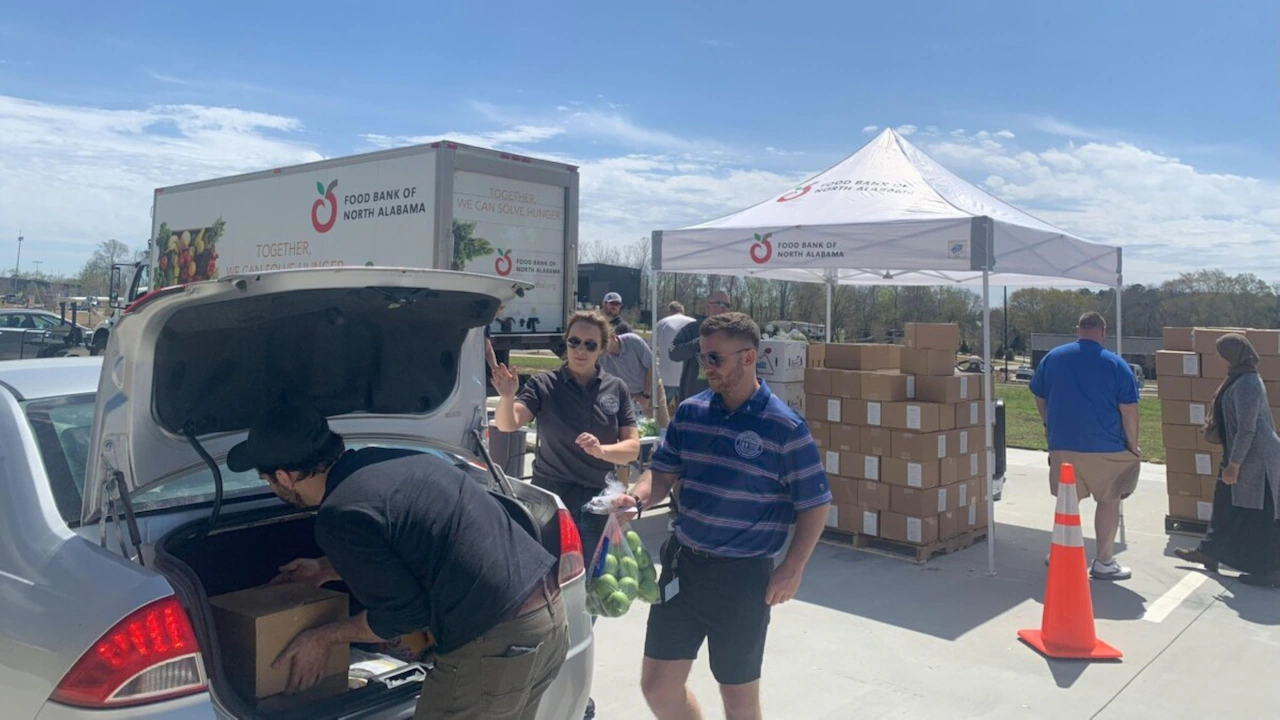Copyright AL.com

Krystal Monroe has cut back to one meal a day, usually a peanut butter sandwich and a can of fruits or vegetables, so her 8-year-old son has enough to eat. As a single mom in Gadsden, she lost her job as a paralegal the day before the Supplemental Nutrition Assistance Program, commonly known as SNAP or food stamps, was suspended. Monroe said she struggled to work because of a deteriorating medical condition that’s gotten worse as she has less food. And she hasn’t been able to find another job. “If I wasn’t spending the money I do have on food, I’d be able to spend it on gas to get my health back on track,” she told AL.com. “So this is having a huge impact on me.” When she was making $17.50 an hour as a paralegal, Monroe said, it was enough to afford two meals a day for herself, food for her son on the days she has custody of him, and biweekly trips from Gadsden to Birmingham to see her specialists. Food boxes from her local church have helped, but sometimes it’s hard to make a meal out of what she’s given, mostly beans and fruit snacks. She said it can be hard to please her son who’s a picky eater, so she saves whatever money she has to buy him the food he likes, like sausages. In October, the U.S. Department of Agriculture announced food stamps would be suspended due to the ongoing shutdown, despite having a contingency fund that could at least pay out partial benefits to people enrolled in SNAP. Since then, the 750,000 Alabamians who rely on SNAP have been inundated with uncertainty about whether they’ll get help buying food this month. Federal courts have ordered the Trump administration to pay out partial benefits, then full benefits. The administration has responded with appeals and has escalated the case to the Supreme Court. The Alabama Department of Human Resources said Monday that partial benefits should be released by the end of the week, but added that a straight percentage reduction may not be what’s received. And politicians on Capitol Hill are moving closer to a deal to end the shutdown, but one that doesn’t include any guarantees on health care subsidies that Democrats held out for for over 40 days. “Just the uncertainty has been a huge deal. And I just finally said, I’m going to plan as if they’re not doing any benefits and work from there,” Monroe said. “Because I don’t trust that any party has our best interest at heart. I don’t believe there’s any care for the single mom or dad or families struggling to get by.” Like Monroe, multiple Alabamians have told AL.com that the suspension of SNAP has created significant hardship and uncertainty in their lives, forcing them to sacrifice basic needs. Falling behind on bills April works part time delivering groceries through Walmart’s Spark app. She can’t work full time because she has a child with an intellectual disability and has to be available for doctors and therapy appointments and school IEP meetings. She spoke on the condition that AL.com not use her full name to protect her daughter’s privacy. She said the SNAP suspension has hit her family on multiple fronts. She didn’t get her monthly benefit of about $500, which she typically can stretch pretty far for her family of three. On top of that, over 17% of residents in rural Calhoun County where April lives and works are also on SNAP. She said her take home pay in her job delivering groceries has plunged from about $300 a week to $100 a week since the suspension. She’s having to sacrifice paying some of her bills to buy groceries. She’s cut out most of the non-essentials like subscriptions for streaming services. “But if it continues to go this way, we might have to cut into the essential stuff,” she told AL.com. “I’m already behind on my car payment, so now I’m risking my car being repossessed. And if that happens, then I can’t even do the work I’m supposed to or get my disabled child back and forth to the appointments that she needs.” The food pantry has helped, though it’s hard to get enough meat there, and meat is the most expensive item at the grocery store. She can stretch each food box about a week. “If we knew how much we could expect to get or how much was coming, I could plan ahead and make arrangements with utility companies,” she said. “But at this point we don’t know what’s gonna come at all so what do we do?” Food bank obstacles There’s a food pantry not far from Brittany’s home in Huntsville. But she uses a walker, and she doesn’t have a car. She can take the bus, but with her walker it’s hard to carry food boxes through the narrow aisles, let alone multiple bus routes and transfer stations. She’s on disability and can’t work. Since her food stamps were suspended, she said she only has $120 to last the month. Brittany moved to Alabama a few years ago and doesn’t have anyone she can call on for help. She spoke to AL.com on the condition that her last name not be used because she said she previously escaped an abusive relationship. She takes two medications - one that costs $63 and another that costs $54. Now that she can’t afford them, she’s asked her doctor to give her samples instead. “I’m hoping they’ll last me to the end of the month,” she told AL.com. Because of the obstacles she faces to get to the food bank, the easiest option is for her to buy the most affordable food she can at the nearby grocery store. This week she’s hoping she budgeted enough to buy a box of spaghetti and pasta sauce to eat for every lunch and dinner. “If the price of noodles goes up, that cuts into my budget,” she said. “And then I’m back to not eating breakfast.” The uncertainty of food prices lately has been as frustrating as the uncertainty of not knowing when SNAP benefits will come. “It feels like it’s being held over your head, like a pinata, and you don’t have a stick to hit it.” Food or health care Melissa Swain used to have a high paying job, she said, making six figures a year as a business owner. Then on Nov. 11, 2021 she had a seizure at work. She had no family history of epilepsy, no prior illnesses or injuries. “It completely flipped my whole life upside down,” Swain told AL.com. She said the seizures made it almost impossible for her to work. She had to sell her company, a house, her cars. After long approval and appeals processes, she said, she was just recently approved for disability, though she hasn’t gotten a check yet. She just got onto SNAP in June. Without any money coming in, Swain said, she’s had to cancel doctor appointments because she can no longer afford copays. She can’t drive because of her epilepsy, so she struggles to get to the food bank. It’s only open on weekdays during work hours, making it difficult to find someone who can give her a ride. She also needs to make it to the pet pantry to feed her six cats and one dog. She’s angry at the government for making “power plays…at the expense of people." “We are the richest country in the world, and we have people starving for health care,” she said, adding that President Trump is “trying to leverage starvation as a tool to get the Democrats to capitulate.” But she is willing to starve, she said. As someone who knows firsthand the importance of having health insurance, she knows what’s at stake. “I know what not having health care does to somebody with a major illness. That illness gets worse,” she said. “I’d rather starve than have Democrats give in to this.”



